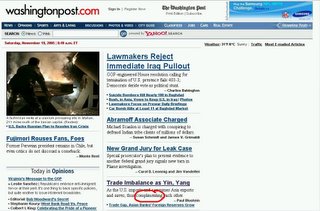Here is an ironic finding I brought back from Iraq. While U.S. public opinion polls show serious declines in support for the war and increasing pessimism about how it will end, polls conducted by Iraqis for Iraqi universities show increasing optimism. Two-thirds say they are better off than they were under Saddam, and a resounding 82% are confident their lives in Iraq will be better a year from now than they are today. What a colossal mistake it would be for America's bipartisan political leadership to choose this moment in history to lose its will and, in the famous phrase, to seize defeat from the jaws of the coming victory.If Lieberman had been running against Bush, my choice would've been pretty hard, even though he
called...for a greater role for religion in public discourse, as a source of shared moral principles and an antidote to "the vacuum of values" in American culture.Gack. But I'm sure Bush wholeheartedly agrees.
Lamenting that it has become unacceptable in many circles to discuss religion, Mr. Lieberman, the Democratic nominee for vice president, said in a speech at the University of Notre Dame that "we have gone a long way toward dislodging our values from their natural source in moral truth."
"Without the connection to a higher law," he said, "it becomes more and more difficult for people to answer the important day-to-day questions that test us: Why is it wrong to lie or cheat or steal? Why is it wrong to settle conflicts with violence? Why is it wrong to be unfaithful to one's spouse, or to exploit children, or to despoil the environment, or defraud a customer, or demean an employee?"
As far as US opinion goes, the Economist reported
Asked whether America will succeed in establishing a stable democracy in Iraq, only 33% of journalists, 27% of academics and 13% of scientists and engineers thought it would. The general public were more optimistic—56% thought their country would eventually prevail. Among the elite, only military officers were cheerier, with 64%.Ah, the elite.





